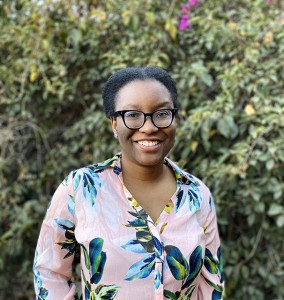CSUN Professor’s Work Included in ‘Best American Short Stories of 2023’

Kosiso Ugwueze
Isioma is fleeing her mother’s house after recovering from a suicide attempt when the bus she is on is taken over by armed kidnappers.
The short story chronicling what happens next, “Supernova” by Kosiso Ugwueze, an assistant professor of English at California State University, Northridge, has been included in “The Best American Short Stories 2023,” an anthology of the year’s best short stories as selected by National Book Award finalist Min Jin Lee and series editor Heidi Pitlor and published by Mariner Books/Harper Collins.
“To have my short story included in the anthology feels surreal,” said Ugwueze, who teaches in CSUN’s College of Humanities. “I was actually in New York when I got the email, and I thought I was being trolled.”
Once Ugwueze realized that the emailed notification was authentic, she said her feelings turned in to “euphoria.”
“The story is set in Nigeria, where I was born — though I was raised in Southern California,” she said. “The fact that a story set outside the United States was selected as among the best American short stories says something about the universality of the immigrant experience. My stories are often weird and sad, whether set in Nigeria or the United States, and sometimes I wonder where they fit.”
In addition to “The Best American Short Stories 2023,” Ugwueze’s short fiction has appeared in Georgia Review, Joyland, Gulf Coast, Subtropics and The New England Review. She is the winner of a New England ReviewAward for Emerging Writers and the recipient of a Barbara Deming Memorial Fund grant for feminist fiction. “Supernova” was originally published in The New England Review.
Ugwueze said “Supernova” was inspired by a grad school creative writing prompt about a character in physical danger.
“Most writers write about what they know, but the idea of a kidnapping popped into my head. Though I’ve never been kidnapped, I had a close encounter in 2010—and I just started writing,” she said. “The story took a life of its own.”
The first draft of the story was completed in one sitting.
“I wanted to capture, in the tone of the story, the incongruence between how we react to trauma and how we’re expected to react,” Ugwueze said. “The main protagonist, Isioma, is doing weird things, and her emotional reactions are not what you would expect in this high-stakes situation.
“I think a lot of my work is layered, even if it does not seem outwardly so,” she continued. “I wanted to capture the general terror, though with some humor, of what it’s often like to navigate parts of Nigeria.”
Ugwueze said that her story made her think of a tweet by a Nigerian publication that noted Nigeria was ranked as the “third most terrorized country in the world.”
“We face security issues and I wanted to talk about that experience,” she said. “I wanted to talk about that Nigerian experience of kidnappers and vigilantes, etc., and people just having to continue living their lives, going to work, and serving their country. I wanted to explore the bravery in that.”
It’s that sense of having to continue to live one’s life, regardless of the circumstances, that may appeal to readers, Ugwueze said. That, and the simplicity of her word choices.
“Accessibility is very important to me as a writer,” she said. “I want people to get what I’m doing.”

 experience
experience